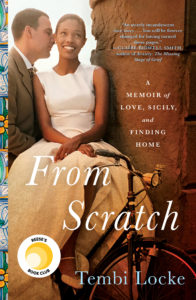In her New York Times bestselling memoir, From Scratch, Tembi Locke invites readers into her heart. Taking them on a journey through the romance of her and her late husband, Saro, her deep experience with grief and her quest for healing in Italy, Locke leads readers to reflect on the brevity and breadth of life. The Conversation Project had the pleasure of connecting with Locke, who shared her insight on a series of questions about end-of-life care conversations. This second part of a two-part series (read part one here) expands on her experience with loss. This time, she shares how Saro’s articulation of his end-of-life wishes helped inform her care for him, how her experience as a caregiver has impacted her perception of the needs of caregivers everywhere and she touches upon the complexity of family dynamics in times of grief.
In your book, you share your experience as a caregiver for Saro. Can you say something about how having “the conversation” (or multiple small conversations) with him helped inform how you cared for him?

We were almost always aligned with what we felt he needed in any given moment. The openness between us as spouses really proved invaluable for me as his caregiver. It made conversations easier. He trusted me with his greatest concerns. And again, it was an ongoing dialogue, particularly as his care shifted and changed over a decade. In all those small conversations, I tried to listen. And when there were things I might not agree with, I tried to step away and discuss those with trusted friends and family. I didn’t want to rebuff him or add additional stress. I’d like to think that approach contributed to the quality of his overall care because he could share without fear of being shut down or dismissed. He felt safe. Also, the trust we built spilled over into my conversations with his medical team. I could be honest with them about the concerns we might or might not have, as both patient and caregiver. I could be a more confident advocate.
Based on your experience, what additional support might be needed for family caregivers when they are going through an experience like yours (from healthcare providers, loved ones, or others)?
I believe wholeheartedly that family caregivers need to a squad of support services from both healthcare providers, loved ones, friends, neighbors, even work colleagues. This “squad” is there for tactical support (transportation, food, laundry, childcare, getting the mail, donating sick days) but also, they can be emotional support. Sending supportive cards, texting to say you are thinking of someone, extending a hug when needed. Or, just being an active listener without judgement or without the need to jump and fix. Also, the caregiving squad can help with pulling together financial support when and where it is needed.
Can you tell us more about the power of family dynamics and extended family during the loss of a loved one and in processing grief?
In my experience, family dynamics play a huge part during the loss of a loved one and when anyone is in the active day-to-day process of grieving. Death upends life. Often everyone in the family is grieving the same person, but often in different ways. In my own case, I had to learn to make space for all the ways grief could look, even in a single day. And I had to let people know that my grief might look different than theirs. Everyone does best when a family can acknowledge that grief is a long-term, life-long process. Also, if children are involved, my best advice is to include them. Make space for their experiences. Invite the child to share, write, or draw any feelings they might have. It helps them feel seen.

As Locke’s experience teaches us, having the conversation with a loved one with serious illness or anyone you care about can help you ensure that they live a quality life until the very end. Locke’s willingness to selflessly listen to Saro’s wishes granted Saro the gift of transparency: he was able to openly share his values without the fear of judgment. Do the same for someone in your life. Who matters most to you? Give them a Conversation Starter Guide, sit down with them and simply listen.
Tembi Locke’s memoir From Scratch can be found here .

